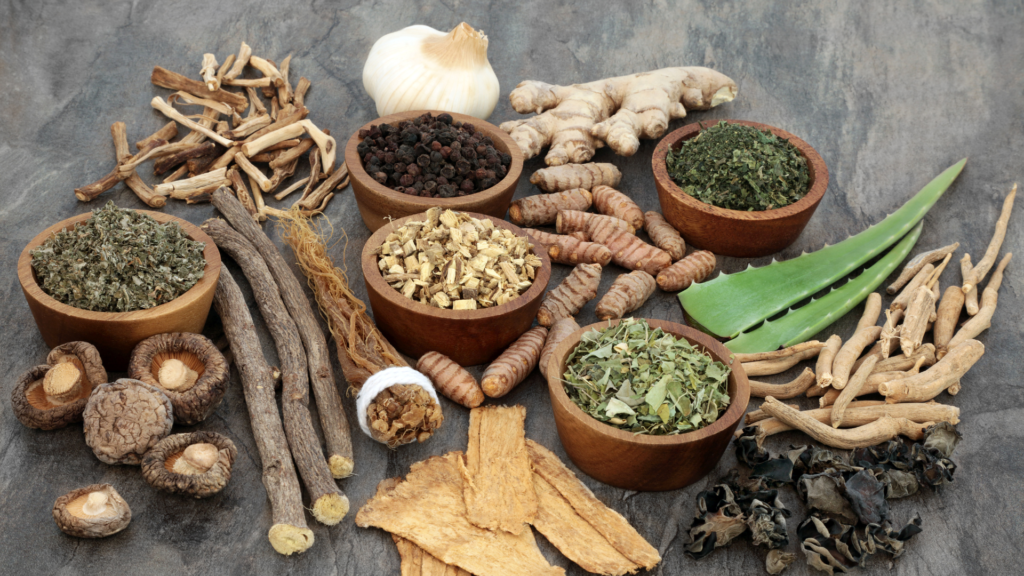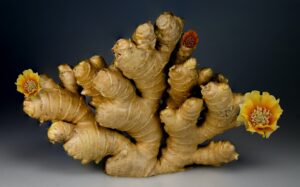
In a world where modern medicine often dominates the conversation, ancient healing systems like Ayurveda offer a refreshing perspective on holistic well-being. Central to Ayurvedic principles is the concept of balance, achieved through proper diet, lifestyle practices, and the use of herbal remedies. In this blog, we delve into the essence of Ayurveda, explore the different types of inflammation, and discover how Ayurvedic herbs can help prevent and treat chronic inflammation.
Understanding Ayurveda
At the heart of Ayurveda lies the belief that each individual possesses a unique constitution, known as “Prakriti,” which determines their physical, mental, and emotional characteristics. This constitution is influenced by the balance of three fundamental energies or “doshas”: Vata (air and space), Pitta (fire and water), and Kapha (earth and water). According to Ayurvedic philosophy, imbalances in these doshas disrupt the body’s natural harmony, leading to illness and disease.
Ayurveda offers a holistic approach to healing, focusing on preventive measures and natural remedies to restore balance and promote longevity. Central to Ayurvedic treatment modalities are herbal medicine, dietary adjustments, lifestyle modifications, yoga, meditation, and detoxification techniques. By addressing the root cause of ailments and supporting the body’s innate healing mechanisms, Ayurveda aims to cultivate optimal health and vitality.
Exploring Inflammation and Its Types
Inflammation is a vital part of the body’s immune response, serving to protect against infection, injury, and foreign invaders. However, when inflammation becomes chronic, it can contribute to a range of health problems, including cardiovascular disease, diabetes, arthritis, and autoimmune disorders. Understanding the different types of inflammation is essential for effective management and treatment:
- Acute Inflammation: This type of inflammation occurs rapidly in response to tissue injury or infection. It is characterized by redness, swelling, heat, pain, and loss of function at the affected site. Acute inflammation is a necessary and beneficial process that helps the body eliminate harmful stimuli and initiate the healing process.
- Chronic Inflammation: Unlike acute inflammation, chronic inflammation persists over an extended period and can damage healthy tissues and organs. It is often associated with conditions such as obesity, diabetes, rheumatoid arthritis, and inflammatory bowel disease. Chronic inflammation is driven by factors such as prolonged exposure to environmental toxins, poor diet, stress, and underlying health conditions.
Harnessing Ayurvedic Herbs for Inflammation
Ayurveda offers a treasure trove of herbal remedies renowned for their anti-inflammatory properties. These herbs work synergistically with the body’s natural healing mechanisms to alleviate inflammation, restore balance, and promote overall well-being. Here are some Ayurvedic herbs commonly used to treat and prevent chronic inflammation:
- Turmeric (Curcuma longa): Turmeric, with its active compound curcumin, is a potent anti-inflammatory herb that inhibits the activity of inflammatory enzymes and mediators. It can be consumed fresh, dried, or as a supplement to reduce inflammation and support joint health.
- Ginger (Zingiber officinale): Ginger contains gingerol, a bioactive compound known for its anti-inflammatory and analgesic properties. Incorporating ginger into your diet or consuming ginger tea can help alleviate symptoms of inflammation and promote digestive health.
- Boswellia (Boswellia serrata): Boswellia, also known as Indian frankincense, contains boswellic acids that inhibit inflammation by targeting specific enzymes involved in the inflammatory process. Boswellia supplements or extracts are commonly used to manage inflammatory conditions like arthritis and asthma.
- Ashwagandha (Withania somnifera): Ashwagandha is an adaptogenic herb that helps the body cope with stress while possessing anti-inflammatory properties. It can be consumed as a supplement or brewed into a calming tea to reduce inflammation and support overall well-being.
- Licorice (Glycyrrhiza glabra): Licorice root contains glycyrrhizin and glycyrrhetinic acid, compounds that exhibit potent anti-inflammatory effects. Licorice tea or extracts can help soothe inflammation in the digestive tract and respiratory system.
Methods of Using Ayurvedic Herbs
Ayurvedic herbs can be incorporated into daily life through various methods of administration:
- Internal Use: Ayurvedic herbs can be consumed internally in the form of herbal teas, decoctions, powders, capsules, or tinctures. These formulations are often tailored to individual needs and dosha imbalances.
- External Application: Some Ayurvedic herbs are applied topically in the form of oils, creams, or poultices to target specific areas of inflammation or discomfort. External application can enhance absorption and promote localized healing.
- Ayurvedic Formulations: Traditional Ayurvedic formulations like Chyawanprash, Triphala, and Mahasudarshan churna combine multiple herbs to address inflammation and support overall health. These formulations are often prepared according to ancient Ayurvedic texts and can be found in specialized Ayurvedic pharmacies.
In conclusion, Ayurveda offers a holistic approach to healing inflammation, combining ancient wisdom with natural remedies to restore balance and vitality. By embracing Ayurvedic principles and incorporating herbal remedies into your lifestyle, you can cultivate optimal health and well-being from the inside out. Remember to consult with a qualified Ayurvedic practitioner or healthcare provider before starting any new herbal regimen to ensure safety and efficacy.



